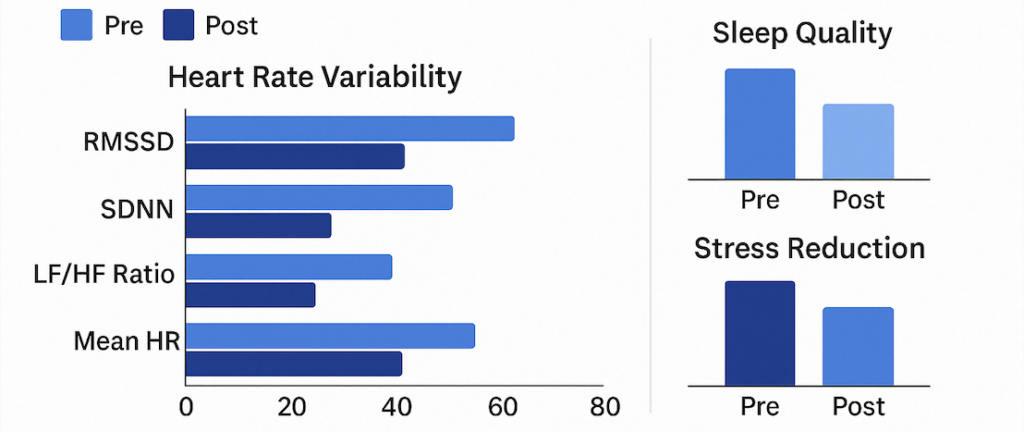Case Report: Improved Heart Rate Variability, Sleep Quality, and Stress Reduction in a 56-Year-Old Male Following Two Weeks of Daily Brainwave Entrainment: A Case Report
Background:
Brainwave Entrainment (BWE) is a non-invasive neurotechnology that uses rhythmic auditory or audiovisual stimuli to synchronize brainwave frequencies, potentially enhancing relaxation, autonomic balance, and cognitive performance. Heart Rate Variability (HRV) is a well-established marker of autonomic nervous system function and stress resilience. Poor HRV is commonly associated with chronic stress, poor sleep, and reduced recovery. This case explores the impact of daily BWE on HRV, sleep, and perceived stress in a middle-aged male.
Case Presentation:
A 56-year-old male presented with self-reported moderate stress levels, suboptimal sleep quality, and low energy during the day. He reported no diagnosed medical conditions and was not on any medication. Baseline assessment included HRV analysis, the Pittsburgh Sleep Quality Index (PSQI), and the Perceived Stress Scale (PSS).
Baseline HRV Parameters:
RMSSD: 21 ms
SDNN: 34 ms
LF/HF Ratio: 2.8
Mean HR: 79 bpm
Baseline Questionnaires:
PSQI: 11 (indicative of poor sleep quality)
PSS: 21 (moderate perceived stress)
Intervention:
The patient underwent daily 20-minute BWE sessions using an audiovisual entrainment device for 14 consecutive days. The sessions were completed in a quiet environment at the same time each evening, incorporating alpha and theta frequency protocols designed to promote relaxation and improve sleep onset.
Outcomes:
Post-intervention assessments were conducted at the end of the 2-week period.
HRV Improvements:
RMSSD: ↑ from 21 ms to 39 ms
SDNN: ↑ from 34 ms to 58 ms
LF/HF Ratio: ↓ from 2.8 to 1.2
Mean HR: ↓ from 79 bpm to 71 bpm
Subjective Outcomes:
PSQI: Improved from 11 to 6 (within range of good sleep quality)
PSS: Reduced from 21 to 13 (mild perceived stress)
The patient also reported:
Faster sleep onset and fewer nocturnal awakenings
Increased morning alertness and energy
Enhanced emotional resilience and clarity of thought during daily tasks
Conclusion:
This case illustrates that daily BWE sessions may significantly enhance autonomic function, sleep quality, and perceived stress in middle-aged adults. The improvements in HRV parameters align with increased parasympathetic tone and reduced sympathetic dominance. Further studies with larger cohorts are recommended to validate these findings and explore optimal session frequency and duration.
